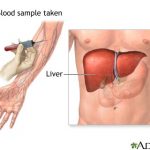Cirrhosis Tests
The Advantages and Disadvantages of Liver Fibrosis Evaluation Methods
Chronic liver disease severity is determined by the liver’s landscape; the more liver cells that are damaged and scarred, the more advanced the liver disease is. Even after an initial diagnosis, the current state of your liver’s tissue is a major factor for predicting prognosis and making ongoing therapeutic decisions. Liver biopsy is the globally…
Read MoreBlood tests for liver function
Blood tests for liver function Some of the standard or routine blood tests that your doctor will order to check “liver function” are in reality only able to detect liver damage. These tests may not be sensitive enough to accurately reflect whether your liver is functioning at its optimum level. These tests will usually be…
Read MoreChanges to MELD score to include serum sodium
(Confusing at first glance but the numbers in the squares show how much your current meld score will go up dependent upon your serum sodium value.) Effective Date Jan 11 2016 NOV 16, 2015 | LIVER/INTESTINE, TRANSPLANT CENTER New Resources Available for Liver Transplant Programs On January 11, 2016, OPTN Policy 9.1 (MELD Score) will…
Read MoreAST/ALT Ratio
AST ALT Ratio for Diagnosis The ratio of AST to ALT has been used as a diagnostic aid: AST:ALT ratio of more than 2:1 is characteristic in patients with alcoholic liver disease a raised AST level out of proportion to the ALT level appears to be caused by a differential reduction in hepatic ALT due…
Read MoreSpecial Considerations in Interpreting Liver Function Tests
Special Considerations in Interpreting Liver Function Tests DAVID E. JOHNSTON, M.D., University of New Mexico School of Medicine, Albuquerque, New Mexico Am Fam Physician. 1999 Apr 15;59(8):2223-2230. A number of pitfalls can be encountered in the interpretation of common blood liver function tests. These tests can be normal in patients with chronic hepatitis or cirrhosis.…
Read MoreProblems With Electrolyte Balance
Problems With Electrolyte Balance The level of any electrolyte in the blood can become too high or too low. The main electrolytes in the blood are sodium, potassium, calcium, magnesium, chloride, phosphate, and carbonate. Most commonly, problems occur when the level of sodium, potassium, or calcium is abnormal. Often, electrolyte levels change when water levels…
Read MoreLooking at Liver Function Bloodwork
Looking at Liver Function Bloodwork When you go for a physical, your healthcare practitioner frequently orders blood tests. Many folks first find out they have hep C after undergoing a routine blood test and finding that one or more of the tests is abnormal. There’s no one test that indicates chronic hepatitis C disease. Tests…
Read MoreLiver Function Tests – A Good Article
Liver Function Tests The purpose of this page is to assist people to understand the reasons for the tests that are generally performed and make some sense of the results. It is not intended to encourage “self diagnosis” A reliable diagnosis of a liver condition can only be made by a qualified medical practitioner after…
Read MoreLiver Enzymes: What Causes Liver Enzymes to Elevate?
What Causes Liver Enzymes to Elevate? Tests that measure liver enzymes are blood tests that specify how much of the special protein that makes up liver enzymes is present in the liver. This enzyme increases the liver’s chemical reactions in order to measure the functions that the liver performs. These include such functions as excretion,…
Read MoreLiver Blood Test ALT/AST Enzyme Values
ALT/AST Enzyme Values Medical Author: Siamak Nabili, MD, MPH Medical Editor: William C. Shiel, Jr., MD, FACP, FACR Introduction to liver blood test An initial step in detecting liver damage is a simple blood test to determine the presence of certain liver enzymes in the blood. Under normal circumstances, these enzymes reside within the cells…
Read More








